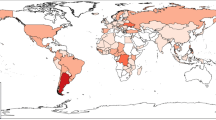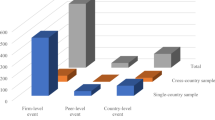Abstract
This paper investigates the relationship between wealth inequality and financial crises. While substantiation of a role for income inequality remains ambiguous in the literature, evidence is presented suggesting a positive relationship between the interaction of wealth inequality with aggregate wealth on systemic financial crises. The evidence is based on panel data for nine countries, some of which expand into the last century, and a linear probability model estimated with country and year fixed effects. The relationship is consistent when accounting for overall financial sector size, credit growth, the money supply, current account, asset bubbles, and robust to estimation method. No significant role is found for income inequality. Predicted probabilities of financial crisis closely track the incidence of financial crises over the last century, remarkably so when compared against a leading benchmark model. It is argued that the empirical relationship between wealth inequality, aggregate wealth and financial crises reveals an important role for the distribution of accumulated assets in the macro-financial stability of rich countries. The distribution of stocks may capture structural vulnerabilities that the distribution of flows cannot expose, and hence more unequal countries in wealth face greater financial instability. An economic network hypothesis is proposed for interpreting the empirical results.
Similar content being viewed by others
References
Abildgren, K.: Estimates of the national wealth of denmark 1845-2013. Working Paper 92, Danmarks Nationalbank (2015)
Acemoglu, D.: Thoughts on inequality and the financial crisis. Presentation at the AEA meetings in Denver. http://economics.mit.edu/files/6348 (2011)
Allen, F., Gale, D: Financial contagion. J. Polit. Econ. 108(1), 1–33 (2000)
Alstadsæter, A., Johannesen, N., Zucman, G.: Tax evasion and inequality. Working Paper No. 23772, National Bureau of Economic Research (2017)
Alvaredo, F., Atkinson, A.B., Chancel, L., Piketty, T., Saez, E., Zucman, G.: Distributional national accounts (dina) guidelines: Concepts and methods used in wid.world. WID.world Working Paper Series 2016/1, World Inequality Database (2017)
Alvaredo, F., Atkinson, A.B., Piketty, T., Saez, E.: The top 1 percent in international and historical perspective. J. Econ. Perspect. 27(2), 3–20 (2013)
Alvaredo, F., Atkinson, A.B., Piketty, T., Saez, E.: World inequality database. wid.world/data/ (2018)
Alvaredo, F., Saez, E: Income and wealth concentration in spain from a historical and fiscal perspective. J. Europ. Econ. Assoc. 7(5), 1140–1167 (2009)
Battiston, S., Gatti, D.D., Gallegati, M., Greenwald, B., Stiglitz, J.E.: Liaisons dangereuses:, Increasing connectivity, risk sharing, and systemic risk. J. Econ. Dynam. Control 36, 1121–1141 (2012)
Bordo, M.D., Meissner, C.M.: Does inequality lead to a financial crisis?. J. Int. Money Finance 31(8), 2147–2161 (2012)
Borio, C., Disyatat, P.: Global imbalances and the financial crisis: Link or no link? BIS Working Paper No 346, Bank for International Settlements (2011)
Carvalho, L., Di Guilmi, C.: Income inequality and macroeconomic instability: A stock-flow consistent approach with heterogeneous agents. CAMA Working Paper 60, ANU Crawford School of Public Policy (2014)
Charbonneau, K.B.: Multiple fixed effects in binary response panel data models. Econ. J. 20, S1–S13 (2017)
Cruz-Gonzalez, M., Fernandez-Val, I., Weidner, M.: Bias corrections for probit and logit models with two-way fixed effects. Stata J. 17(3), 517–545 (2017) [https://EconPapers.repec.org/RePEc:tsj:stataj:y:17:y:2017:i:3:p:517-545]
Cynamon, B.Z., Fazzari, S.M.: Inequality, the great recession, and slow recovery. Available at SSRN:. https://doi.org/http://ssrn.com/abstract=2205524 or https://doi.org/10.2139/ssrn.2205524 (2014)
Davidson, R., MacKinnon, J.G.: Several tests for model specification in the presence of alternative hypotheses. Econometrica 49(3), 781–793 (1981)
Elliott, M., Golub, B., Jackson, M.O.: Financial networks and contagion. Am. Econ. Rev. 104(10), 3115–53 (2014)
Fuest, C., Peichl, A., Waldenström, D., et al.: Piketty’s R-G Model: Wealth Inequality and Tax Policy. In: Walley, J., Nam, C.W. (eds.) CESifo Forum, vol. 16, pp 03–10. Ifo Institute for Economic Research at the University of Munich, Ifo Institute (2015)
Graeber, D.: Debt: The First 5,000 Years. Brooklyn: Melville House (2011)
Hauner, T.: Essays on Inequality and Macroeconomic Stability. Ph.D. thesis, City University of New York (2017)
Hudson, M.: The Lost Tradition of Biblical Debt Cancellations. Henry George School of Social Science (1993)
Jayadev, A.: Distribution and crisis: Reviewing some of the linkages. In: Wolfson, M., Epstein, G. (eds.) The Handbook of the Political Economy of Financial Crises, chap. 5, pp 95–112. Oxford University Press, Oxford (2013)
Jorda, O., Schularick, M., Taylor, A.M.: Macrofinancial history and the new business cycle facts. In: Eichenbaum, M., Parker, J.A (eds.) NBER Macroeconomics Annual 2016, vol. 31. University of Chicago Press (2017)
Kiley, M.: What macroeconomic conditions lead to financial crises? Finance and Economics Discussion Series 2018-038, Washington: Board of Governors of the Federal Reserve System, https://doi.org/10.17016/FEDS.2018.038 (2018)
Kirschenmann, K., Malinen, T., Nyberg, H.: The risk of financial crises:, Is there a role for income inequality?. J. Int. Money Finance 68, 161–180 (2016)
Knoll, K., Schularick, M.: No price like home:, Global house prices 1870–2012. Am. Econ. Rev. 107(2), 331–353 (2016)
Kopczuk, W., Saez, E.: Top wealth shares in the united states, 1916-2000:, Evidence from estate tax returns. Nat. Tax J. 57(2), 445–87 (2004)
Kregel, J.: Regulating the financial system in a minskian perspective. In: Bresser-Pereira, L.C, Kregel, J., Burlamaqui, L. (eds.) Financial Stability and Growth: Perspectives on Financial Regulation and New Developmentalism, chap. 9, pp 127–142. Routledge, Evanston (2014)
Krugman, P.: Inequality and crises. New York Times blog ”The Conscience of a Liberal”,(June), http://krugman.blogs.nytimes.com/2010/06/28/inequality-and-crises(2010)
Kumhof, M., Ranciere, R.: Inequality, leverage and crises. IMF Working Papers 10/268, International Monetary Fund (2010)
Kumhof, M., Rancière, R., Winant, P.: Inequality, leverage and crises. Am. Econ. Rev. 105(3), 1217–45 (2015)
Lucchino, P., Morelli, S.: Inequality Debt and Growth. Report, Resolution Foundation (2012)
Lysandrou, P.: Global inequality as one of the root causes of the financial crisis: a suggested explanation. Econ. Soc. 40(3), 323–344 (2011)
Malinen, T.: Does income inequality contribute to credit cycles?. J. Econ. Inequal. 14, 309–325 (2016)
Mason, J., Jayadev, A.: fisher dynamics in us household debt, 1929–2011. Am. Econ. J.: Macroeconomics 6(3), 214–234 (2014)
Milanovic, B.: Two views on the cause of the global crisis. YaleGlobal Online. http://yaleglobal.yale.edu/content/two-views-global-crisis (2009)
Minsky, H.P.: John Maynard Keynes. Columbia University Press New York (1975)
Minsky, H.P.: Stabilizing an unstable economy. Hyman P. Minsky Archive, (Paper 144) (1986a)
Minsky, H.P.: Stabilizing an Unstable Economy. Yale University Press (1986b)
Minsky, H.P.H: The financial instability hypothesis. Working Paper 74, Jerome Levy Economics Institute of Bard College (1992)
Morelli, S., Atkinson, A.B.: Inequality and crises revisited. Economia Politica, 1–21 (2015)
Philippon, T., Reshef, A.: An international look at the growth of modern finance. J. Econ. Perspec. 27(2), 73–96 (2013)
Piketty, T.: Capital in the 21st Century. Harvard University Press (2014)
Piketty, T., Zucman, G.: Capital is back: Wealth-income ratios in rich countries, 1700-2010. Quart. J. Econ. 129(3), forthcoming (2014)
Rajan, R.G.: Fault Lines: How Hidden Fractures Still Threaten the World Economy. Princeton University Press, Princeton (2011)
Reinhart, C.M., Rogoff, K.S.: From financial crash to debt crisis. NBER Working Paper 15795, National Bureau of Economic Research (2010)
Roine, J., Waldenström, D.: Long-run trends in the distribution of income and wealth. In: Atkinson, A.B., Bourguignon, F. (eds.) Handbook of Income Distribution, vol. 2, chap. 7, pp. 469–592 North-Holland (2015)
Saez, E., Zucman, G.: Wealth inequality in the united states since 1913: Evidence from capitalized income tax data. NBER Working Paper 20625, National Bureau of Economic Research (2014)
Saez, E.: Wealth inequality in the united states since 1913:, Evidence from capitalized income tax data. Quart. J. Econ. 131(2), 519–578 (2016)
Schularick, M., Taylor, A.M.: Credit booms gone bust:, Monetary policy, leverage cycles, and financial crises, 1870–2008. Am. Econ. Rev. 102(2), 1029–1061 (2012)
Stiglitz, J.E.: Macroeconomic fluctuations, inequality, and human development. J. Human Develop. Capab. 13(1), 31–58 (2012)
Stockhammer, E.: Financialization, income distribution and the crisis. Ivest. Econ. LXXI(279), 39–70 (2012)
Stockhammer, E.: Rising inequality as a cause of the present crisis. Camb. J. Econ. 39, 935–958 (2015)
Toledano, C., Alvaredo, F., Piketty, T.: The Distribution of Wealth in Spain: Evidence from Capitalized Income Tax Data. Master’s thesis, Paris School of Economics (2015)
Author information
Authors and Affiliations
Corresponding author
Additional information
Publisher’s note
Springer Nature remains neutral with regard to jurisdictional claims in published maps and institutional affiliations.
The views presented are those of the author and do not represent the Federal Reserve Bank of New York or the Federal Reserve System.
Electronic supplementary material
Below is the link to the electronic supplementary material.
Rights and permissions
About this article
Cite this article
Hauner, T. Aggregate wealth and its distribution as determinants of financial crises. J Econ Inequal 18, 319–338 (2020). https://doi.org/10.1007/s10888-020-09444-9
Received:
Accepted:
Published:
Issue Date:
DOI: https://doi.org/10.1007/s10888-020-09444-9




